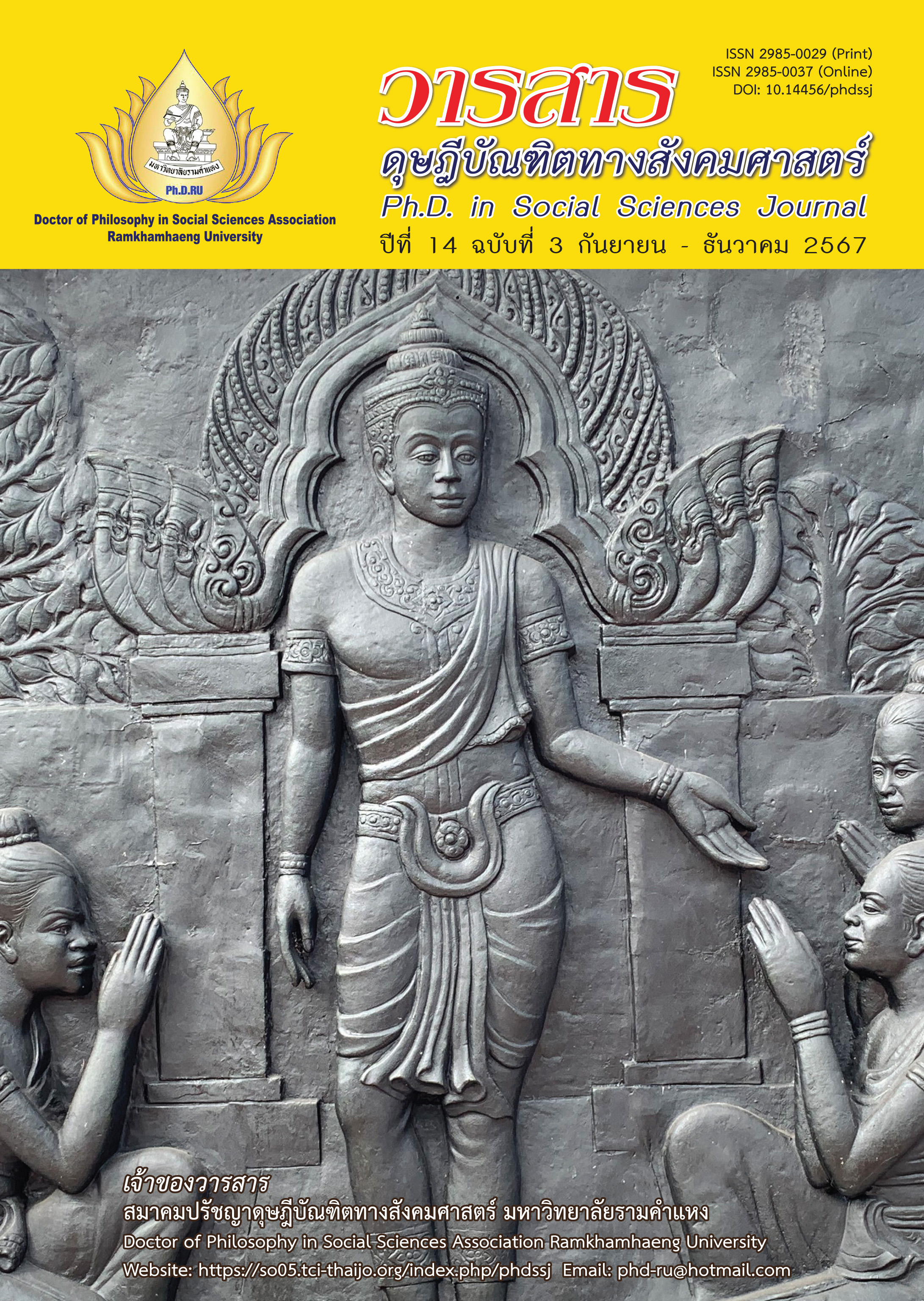The Development of a Flexible Management Model for Middle-Level Executives of the Ministry of Finance
Main Article Content
Abstract
This research article aims to study (1) Examine the flexible management components for Ministry of Finance (MOF) middle-level executives; and (2) Create a model of these components. In the study, mixed method research, qualitative research, and quantitative research were all used. Four sets of informants provided the data: (1) 10 experts for an in-depth interview; (2) 473 questionnaire responses; (3) 14 experts for a group discussion forum; and (4) 5 experts for the evaluation of guidelines. The research tools included a manual evaluation checklist, a pattern assessment, a questionnaire, and an in-depth interview guide. The qualitative data was analyzed by content analysis, while statistical techniques were utilized to understand the quantitative data, including frequency, percentage, mean, standard deviation, and exploratory factor analysis.
Findings are as follows: Four key elements were included in the creation of the MOF’s flexible management model for middle-level executives: (1) flexible executive competencies; (2) information technology; (3) flexible work processes; and (4) effective management. The experts also concurred that the Ministry of Finance’s manual for middle-level executives on creating flexible management was relevant and applicable.
Article Details

This work is licensed under a Creative Commons Attribution-NonCommercial-NoDerivatives 4.0 International License.
Academic articles, research articles, and book reviews in the Ph.D. in Social Sciences Journal are author’s opinions, and not the publisher’s, and is not the responsibility of the Ph.D. in Social Sciences Journal Philosophy Association, Ramkhamhaeng University. (In the case that research is done on human, the researcher has to be trained in Ethics for Doing Research on Human Training and has to produce the evidence of the training).
References
Allen, L. A. (1958). Management and organization. McGraw-Hill.
Altindag, E., & Siller, F. (2014). Effects of flexible working method on employee performance: An empirical study in Turkey. Business and Economics Journal, 5(3), 1-7.
Brown, P. (2023). The power of flexibility: Navigating leadership styles with participative and situational theories. Retrieved from https://www.linkedin.com/pulse/power-flexibility-navigating-leadership-styles-theories-patrick-brown
Christian, A. (2023). Why middle managers are often cast as villains. Retrieved from https://www.bbc.com/worklife/Article/20230118-why-middle-managers-are-often-cast-as-villains
Gravetter, F. J., & Forzano, L.-A. B. (2012). Research methods for the behavioral sciences (4th ed.). Wadsworth.
Davis, C. E., & Lester, J. P. (Eds.). (1988). Dimensions of hazardous waste politics and policy. Greenwood.
Hayward, S. (2018). The agile leader: How to create an agile business in the digital age. Kogan Page.
Jankanakittikul, T., Jaroenchai, K., & Chotechoei, N. (2019). The model of modern management effect to the success of an organizations. College of Asian Scholars Journal, 9(2), 64-68. [In Thai]
Kaewsanan, K., & Chirinung, P. (2021). Organization management to success. Journal of Buddhistic Sociology, 6(4), 88-108. [In Thai]
Kang, Y. (2023). Research on the impact of flexible human resource management on enterprise organization performance-take the asset appraisal industry as an example. The EUrASEANs: Journal on Global Socio-Economic Dynamics, 2(39), 70-82.
Kasemsin, S. (2013). New personnel management plan (5th ed.). Thai Watana Panich. [In Thai]
Likert, R. (1932). A technique for the measurement of attitudes. Archives of Psychology, 22(140), 5-55.
Mawson, A. (2023). A agile working, flexible working and hybrid working–what’s the difference?. Retrieved from https://www.advanced-workplace.com/hybrid-working-strategy/agile-working-flexible-working-and-hybrid-working-whats-the-difference
McClelland, D. C. (1973). Testing for competence rather than for “intelligence.” American Psychologist, 28(1), 1-14.
Ministry of Finance. (n.d.). History of the Ministry of Finance. Retrieved from https://mof.go.th/th/detail/2018-12-21-14-57-33/2018-12-21-16-02-08 [In Thai]
Office of the Civil Service Commission. (2022). Public sector manpower 2022. Author. [In Thai]
Office of the National Economic and Social Development Council. (2022). The thirteenth national economic and social development plan (2023-2027). Author. [In Thai]
Pinyo, T. (2012). Technique of factor analysis for research work. Fernkaluang. [In Thai]
Pipitkun, K. (2018). Quality of questionnaire tools: Validity and reliability in public administration for research. Academic and Research Journals Northeastern University, 8(2), 104-110. [In Thai]
Prasatkeaw, T., Pinthapataya, S., Boonyasopon, T., & Teeraviwatchai, A. (2020). Model development of middle manager potential for competitiveness in aviation business industry. The Journal of King Mongkut’s University of Technology North Bangkok, 30(4), 717-725. [In Thai]
Prasertsri, R. (2006). Modern management. Dharmasarn. [In Thai]
Punyadong, W., & Prasomsuk, T. (2023). Promoting the use of information technology systems for budget management of Rajaprajanugroh 22 school in Mae Hong Son province. Journal of Educational Management and Research Innovation, 5(4), 909-920. [In Thai]
Sasin Graduate Institute of Business Administration of Chulalongkorn University. (2013). Ministry of Finance change management program. Author. [In Thai]
Sirait, E. R. E., & Nugroho, B. A. (2021). The effectiveness of flexible working arrangements as a form of digital transformation from the perspective of Indonesian government employees. Journal of Information Technology and Its Utilization, 4(2), 42-50.
Sushil (2016a). Managing flexibility: Developing a framework of flexibility maturity model. In Sushil, K. T. Bhal, & S. P. Singh (Eds.), Managing flexibility: People, process, technology and business (pp. 3-19). Springer.
Sushil, P. (2016b). Theory of flexible systems management. In Sushil, J. Connell, & J. Burgess (eds.), Flexible work organizations: The challenges of capacity building in Asia (pp. 3-20). Springer.
Thailand Future Foundation. (2021). Future of government. Retrieved from https://www.thailandfuture.org/post/future-of-government-องค-กรภาคร-ฐแห-งอนาคต [In Thai]
Thongprasit, K., Boonyasopon, B., Wisuttipaet, S., & Siengchin, S. (2023). Competency development for personnel responsible for energy management in textile industry under the Ministry of Energy. The Journal of King Mongkut’s University of Technology North Bangkok, 33(1), 315-326. [In Thai]
Yamane, T. (1973). Statistics: An introductory analysis (3rd ed.). Harper & Row.
Yavirach, N. (2017). Modern management (11th ed.). Triple Group. [In Thai]


